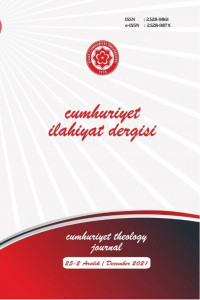Doketizm, Hz. İsa ve Kur’an: İslam Çarmıh Söylemini Doketizm’den mi Aldı?
Docetism, Jesus and Qurʾān: Did Islam Take the Discourse of the Cross from Docetism?
Author(s): Ömer Faruk ArazSubject(s): Theology and Religion, Islam studies, Comparative Studies of Religion
Published by: Cumhuriyet Üniversitesi İlahyat Fakültesi
Keywords: History of Religions; Docetism; Qurʾān; St. Jesus; Cross;
Summary/Abstract: The Qurʾān states that it is the last link in the chain of divine books, such as the Torah, Psalms, and the Gospel, and that it is also the approval and regulator of these books. As a result, there are some mutual narratives with other holy books, as well as some issues that differ from them and bring different explanations from them. These issues have been the subject of polemics, especially with Judaism and Christianity throughout the history. The crucifixion of Jesus Christ formed the foundation of Christianity theology. However, the subject of ‘the cross’ has also been one of the most important issues by which Christian communities have made different explanations and interpretations since the 1st century, and have diverged accordingly. Although the docetists, who are our subject, are divided into many groups with different views, they generally accept that Jesus Christ was of a different nature from other people, had a divine nature, and therefore, it was not possible for him to be crucified. In the only verse in the Qurʾān that deals with the cross of Jesus Christ, it is mentioned that Jesus was not crucified. For this reason, a significant part of the interpretations in the commentaries have some similarities with the views of the docetics at first glance. It is possible to see more of the similarities mentioned in the commentaries, especially in the so-called “substitutionary interpretation”, in which it is stated that someone else was crucified instead of Jesus. In the Christian world, it is often claimed that Islam emerged in the Arabian Peninsula, where Christian heretics are abundant, and that it was influenced by the views of some heretic Christians. In this context, starting with John of Damascus in the 8th century, based on the above-mentioned similarities, many Christian researchers throughout the history claimed that the Qurʾān took this view from docetics. In this study, there has been an attempt to examine all of these claims. In this context, first, the docetics were researched, and as a result, it was revealed that Christians named groups with very different views from the early times as “docetic”, and that there was no standart use of the concept of “docetic” in the Christian World for centuries. It appears that it was determined that the concept would be used as a kind of umbrella concept for groups considered heretical. Then in the article, the different translations and interpretations of the verse in the Qurʾān and certain sources from the classical and modern Islamic literature were selected and identified. This led to the examination of how the said verse was understood in the Islamic world throughout the history. In this context, all types of substitutionary interpretations in the commentaries were made into a list by mentioning the sources of these interpretations, and then, these interpretations and the views of the docetics were compared. After revealing the similarities and differences in the explanations and interpretations in the commentaries and the views of the docetics, a new perspective on the subject was attempted by trying to explain the verse outside of its traditional interpretation throughout the history, considering the context of this verse and the Jewish literature. Considering that various Jewish claims about Jesus and Mary were responded to at the beginning of Qurʾānic the verse and just before the verse that mentions the cross, information in the Jewish religious literature was consulted about the allegations that Jews killed Jesus as mentioned in this verse. In this context, Jewish claims about the end of the life of Jesus in the Talmud, that they first killed him and then crucified him, were adressed and researched. Furthermore, an attempt is made to explain that the use of wa-mā qatalūhu wa-mā ṣalabūhu in the verse may be an answer to the claims of the Jews that they first killed Jesus and then crucified him. These claims of the Jews in the Talmud are further explored, and considering the context of the Jews of that time, it is explicated that these actions would not have been possible due to the political conditions in that period. Taken together, this study has attempted to address that the view claiming that docetics have an impact on the Quran via the related verse is not validand that the actual recipient of the verse is the Jews.
Journal: Cumhuriyet İlahiyat Dergisi
- Issue Year: 25/2021
- Issue No: 2
- Page Range: 713-734
- Page Count: 22
- Language: Turkish

